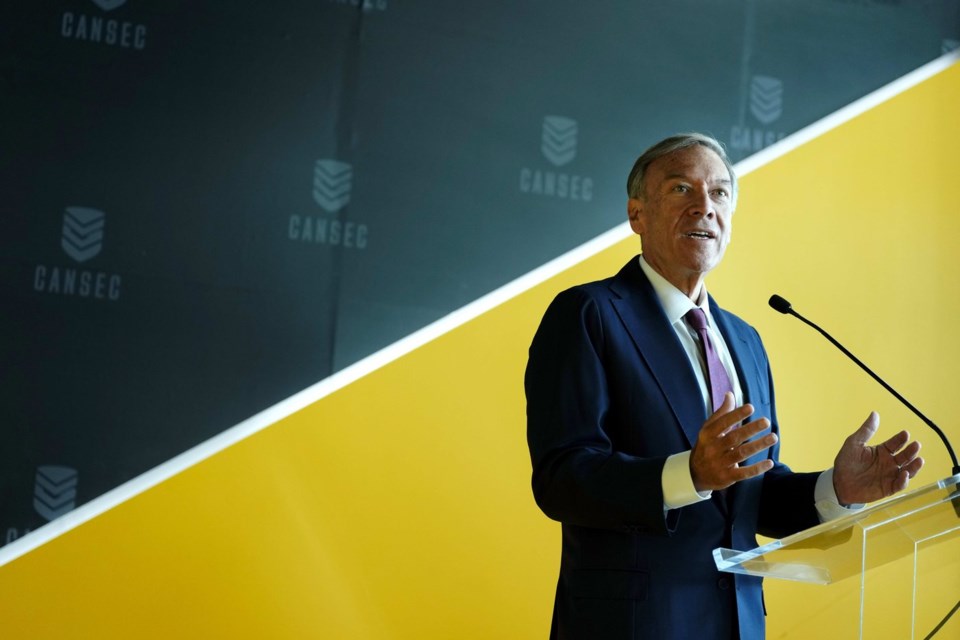OTTAWA — Canada does not have to worry about its sovereignty being threatened by the United States, U.S. President Donald Trump's former secretary of state Mike Pompeo said Wednesday.
While Trump has launched tariff barrages that threaten the Canadian economy and has called repeatedly for Canada to become a U.S. state, he's now urging the government of Prime Minister Mark Carney to join a planned multi-billion-dollar space-based missile defence project.
"Canada is going to do all the things necessary to protect its own sovereignty, I'm convinced of it," Pompeo told a press conference on the margins of the CANSEC military trade show in Ottawa Wednesday.
While he urged Canadians to trust the U.S., he said he can't recall Trump musing about annexing Canada during his time in the president's first administration.
"It was new to me when I saw it," Pompeo said. "He's a consummate deal-maker."
Pompeo's comments came a day after King Charles delivered a speech from the throne in Parliament that emphasized Canada's status as a sovereign nation and said the "true North is strong and free."
As Canada's economy reels under the impact of Trump's stop-and-go tariffs, the president is also putting new pressure on Canada's treasury.
Trump and NATO allies are pressing Ottawa to bulk up its national defence budget by tens of billions of dollars a year.
NATO Secretary General Mark Rutte said Monday that he expects NATO allies to commit to spending five per cent of their GDP on defence at the NATO meeting in The Hague next month — well beyond the current 2 per cent benchmark that Canada has failed to meet.
Defence Minister David McGuinty told the CANSEC audience of military brass and industry merchants Wednesday that the new Carney government intends to move with "immediate and decisive action" to rebuild Canada's military.
He described its sense of urgency by citing the speed at which Canada built up its navy at the start of the Second World War. McGuinty also warned that countries around the world are adjusting quickly to a changing global threat environment.
"I read yesterday that the Netherlands let 22 per cent of their public servants go — except for the defence department — to meet their obligations," he said in a state-of-the-union style speech at CANSEC.
"Others are increasing corporate taxes or running larger deficits in anticipation of the troubles that might be forthcoming."
McGuinty said some countries are "doing away with national holidays" — a reference to Denmark's recent decision to abolish a long weekend holiday called "Great Prayer Day" in an attempt to bring in more tax revenue to cover its NATO defence spending target.
The Liberal party's election platform states that the single largest sum in Prime Minister Carney's spending plan — more than $30.9 billion — is earmarked for defence over the next four years.
McGuinty's remarks came just a day after the Liberal government signalled Canada plans to join ReArm Europe, a major European defence procurement pact.
McGuinty said joining that plan will diversify Canada's defence partnerships and give it access to new opportunities in Europe's $1.25 trillion defence marketplace. McGuinty refused to answer reporters' questions after his speech and ducked out through a back door by the stage.
In an interview with CBC News Tuesday evening, Carney said his government wants to join ReArm Europe by Canada Day.
The Canadian Press has asked the European Commission whether Carney's timeline is realistic. A spokesperson for security policy said Wednesday the commission will provide a response but has not done so yet.
ReArm Europe is a plan to leverage loans and redraw fiscal rules to pump funds into rearming European nations and build up domestic defence industries. The initiative was launched after Trump suspended U.S. military aid supporting Ukraine's defence in its ongoing war with Russia, which has recently intensified.
The Canadian Press asked Pompeo whether he worries that Canada joining the ReArm program might divert procurement away from the U.S. and toward Europe.
"I always worry about that at one level. Conversely, the United States is the security partner for Canada and Canada is incredibly important for the United States," he said. "In the end, the relationship between Canada and America is going to remain through Democrats, Republicans and everything in between that."
One defence procurement project is top-of-mind for the federal government right now. Carney has ordered a review of Ottawa's purchase of F-35 fighter jets — a contract won by the U.S. firm Lockheed Martin but hotly contested by European-based companies. Ottawa has been tight-lipped about where that review is headed.
Asked about the F-35 review at the CANSEC event Wednesday, Lt.-Gen. Eric Kenny of the Royal Canadian Air Force said he'll have to wait and see where the government lands.
He was more open when speaking about what ReArm Europe might mean for Canada.
“The lessons that we're seeing through the brutal war in Ukraine and the loss of countless of lives unnecessarily by the illegal invasion of Russia … show us that we need to be prepared for potential future threats,” he said.
“ReArm Europe is one of those ways of diversifying portfolios and I think it’ll probably be good for Canadian business.”
This report by The Canadian Press was first published May 28, 2025.
Kyle Duggan, The Canadian Press



